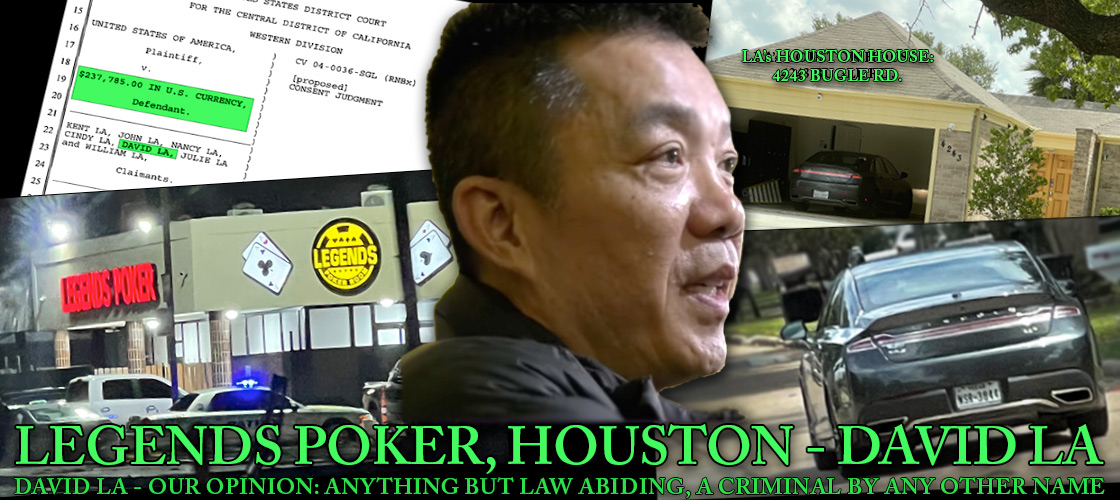It’s been said that poker in Texas exists in a gray legal area. That’s certainly true in Houston.
Many poker “social clubs” or rooms skirt state and local laws; some don’t even “skirt” the laws, they operate in knowing and willful opposition to those laws by taking a “rake” from the games, which is illegal in Texas.
Houston city ordnance (Ord. No. 2014-674, § 4, 6-25-2014) sums up the the application of the directives governing gaming/poker establishments as such:
Sec. 5-190. – Effect. Each licensee under this article must meet and comply with all requirements of law applicable to the premises or any activity conducted thereon and the issuance of a license under this article shall not excuse the licensee, his agents or employees or any patrons of such premises therefrom.
That means no one is exempt from the laws. No special treatment. Let’s look at what this ordnance has to say about the legal operation of a social club or poker room that is hosting card games.
There is a criminal statute banning gambling in Texas. However, some 30-plus establishments have taken advantage of perceived loopholes in the law to operate openly as private poker clubs.
Private poker clubs have been popping up all over Texas over the past number of years, and their legality seems to be perpetually under debate. Owners of these clubs claim they are operating in accordance with Texas gambling laws by only charging membership fees and dues rather than taking a percentage of the pot, which is known as a “rake.” Critics, however, claim they are merely exploiting a loophole in the law. As mentioned, some of these clubs implement the rake, fully knowing that it is illegal to do so under Texas law.
A person can be prosecuted for gambling under Section 47.02 of the Texas Penal Code, which provides that a person commits an offense if he or she plays and bets for money or other thing of value at any game played with cards, dice, balls, or any other gambling device.
According to the State Bar of Texas’ Texas Bar Blog, however, there are instances, relating to that statute that provides the following defenses to prosecution:
- the actor engaged in gambling in a private place;
- no person received any economic benefit other than personal winnings; and
- except for the advantage of skill or luck, the risks of losing and the chances of winning were the same for all participants.”
But Texas law also states that, while it is not illegal to play poker in the state, if there is money on the table, the operator of the game cannot take a “rake,” or a fee from the game. Poker clubs have gotten around that restriction by charging a “membership fee” for players to come in the door and play at the tables. Additionally, the businesses make additional money by selling food on the property (alcohol is banned in the clubs).
At least two of these private clubs recently came under the scrutiny of Harris County prosecutors not long ago in a move to try to crack down on these private social clubs or poker rooms. The Houston Police Department and Harris County District Attorney’s Office raided Prime Social Poker Club and Post Oak Poker Club in 2019; bank accounts were frozen and money seized.
“Poker rooms are illegal in the State of Texas,” District Attorney Kim Ogg said at the time of the raids. “We are changing the paradigm regarding illegal gambling by moving up the criminal chain and pursuing felony money laundering and engaging in organized crime charges against owners and operators.” She added that, “Players are not being targeted.”
Just two months later, however, Harris County prosecutors dismissed all charges against nine defendants who faced charges for running two Houston poker rooms. Citing potential conflicts of interest, the District Attorney’s Office identified a potential witness who is a former contract employee and a political fundraiser.
Attorney Joe Magliolo, who represented the owners of Prime Social Poker Club, said his clients were told by none other than the Harris County District Attorney’s Office itself that they were operating within the law. And so that’s what they believed. Until they were raided. Magliolo said his law firm investigated the charges brought by DA Ogg in defense of his client and determined those claims were true. That information subsequently was presented to the DA’s office.
“I think (District Attorney) Kim (Ogg) took a personal interest in it and examined the information, and the next thing we heard, the cases against the four defendants were dismissed,” Magliolo said.
Harris County DA Ogg took a strong stance against the poker rooms at the time of the raids. To reiterate, her press release announcing the raids and arrests stated that, “Poker rooms are illegal in the State of Texas.” Of course, it took a little time between the raids and the charges being dropped for the DA’s office to recognize that their office had, in fact, been consulted by Prime Social and Post Oak and had been assured that it was OK for the poker clubs to operate.
According to the Houston Chronicle newspaper’s reporting on the case, multiple conflicts of interest were cited between state and local officials and Houston private poker clubs as leading to the collapse of the criminal cases and a reexamination of the relationships between elected officials and the game room operators.
Ogg herself cited conflicts of interest between targets of the investigation and staffers in her office, including a financial crimes consultant for the DA’s office who had been lobbying on behalf of Prime Social as it sought legitimacy from elected officials and law enforcement, the newspaper reported.
This person also worked as a Democratic fundraiser and adviser for a number of local elected officials and candidates, including donating to their campaigns, the Chronicle reported.
Ogg told the newspaper that the conflicts of interest included donations from the poker room operators to Texas Attorney General Ken Paxton and Harris County Commissioner Adrian Garcia and the courting of Mayor Sylvester Turner by Primal Social co-owners Brandon Jimenez and David Nguyen in a Dec. 18, 2018, business meeting.
Although Ogg said that she forwarded information on those cases to the FBI, both Prime Social and Post Oak have been fully operational ever since the charges were dropped by the Harris County, Texas DA in July 2019.

